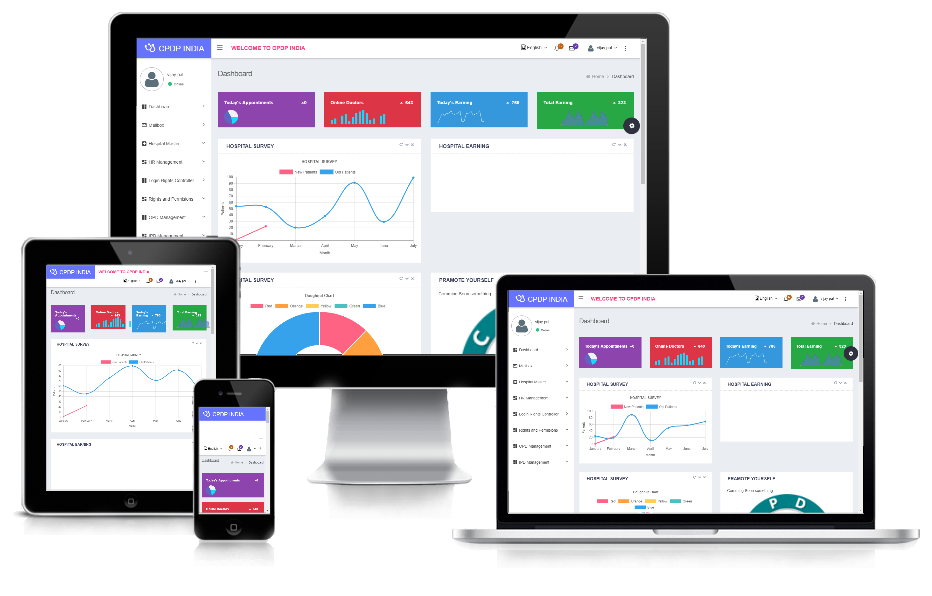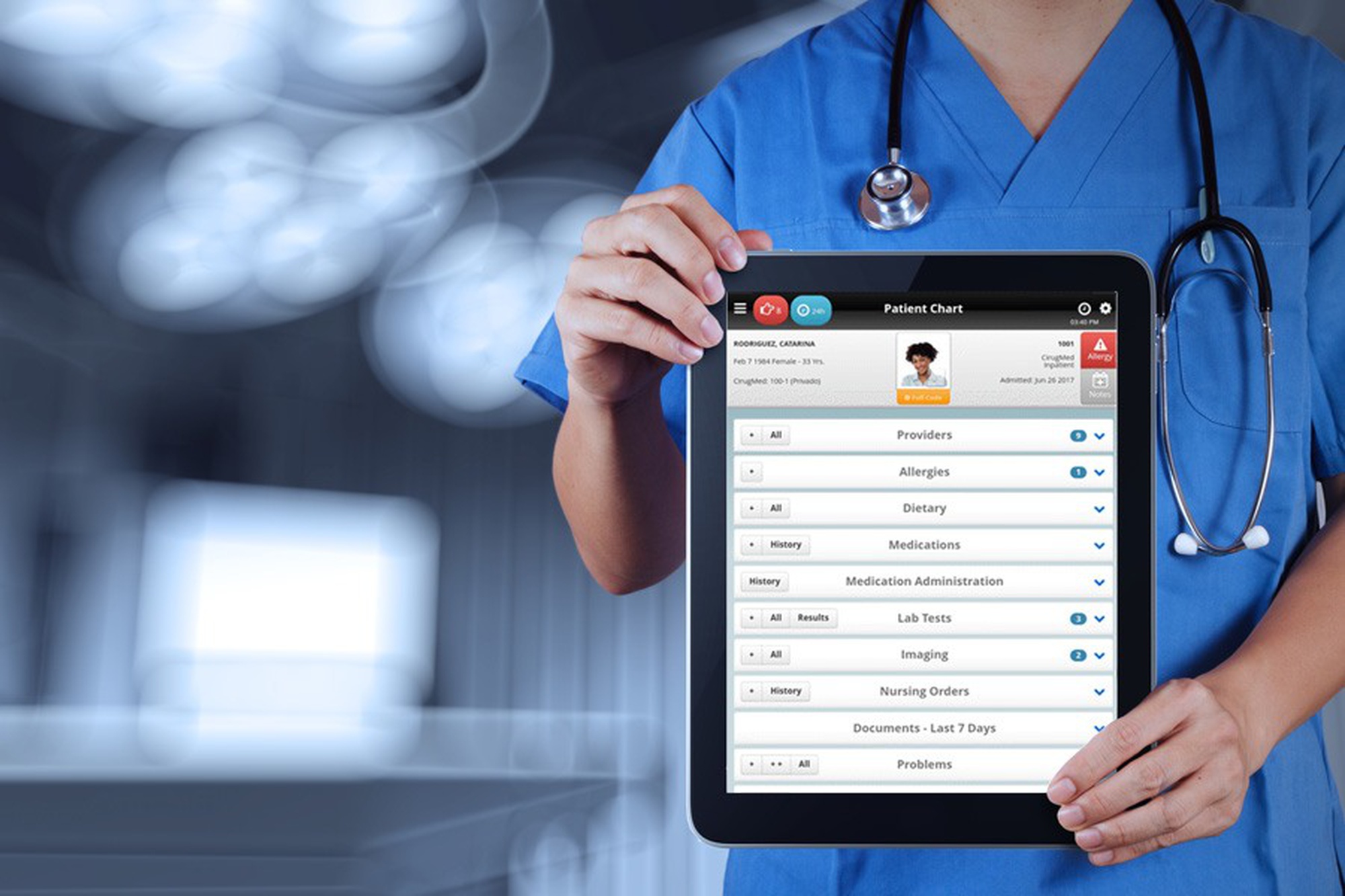As the whole world embraces digital innovation, so does the healthcare industry. In-hospital care and management, technology solutions have become the latest trend, especially during the COVID-19 pandemic. Hospital management system development is one of the ways for a hospital to move with the times, become patient-centric and efficient.
A hospital management system (HMS) is software that controls all internal processes, coordinates data, and provides fast communication between the clinic’s departments. It’s a set of services that covers the needs of the facility and ensures patient satisfaction.
Creating a hospital management system software has many benefits. Automation, workflow optimization, and secure data storage are only a few of them. Now, let’s see what hospital management solutions offer and how to develop a custom HMS.
The value of hospital management system development
Today, healthcare providers face new challenges. According to McKinsey, those are:
-
the complex needs of patient populations
-
high expectations high standards of patients
-
availability and expectations of the healthcare workforce
-
affordability of high-quality care
-
the emergence of high-volume specialized centers
-
new requirements to measure and publish quality metrics
Increased productivity and operations improvement seems to answer those issues. Luckily, creating a hospital management system offers both. How? Let’s take a look at the main benefits of hospital management system development.
Increased productivity and improved management
Building a custom hospital management system solution is an investment in the healthcare unit’s efficiency and workers’ productivity. An HMS not only reduces paperwork for the employees but also tracks all their activities. This helps the hospital’s administration to distribute the workload adequately. Also, an HMS makes managing resources and supply efficient. For instance, with hospital management software, you can detect and reduce medical equipment downtime.

Data security
Storing patient data digitally is a much safer solution than storing it manually. That’s why HMS development contributes to the security and reliability of a hospital. No unauthorized user can log in and access valuable information inside a system with multi-layer protection.
Human error reduction
Hospital management software reduces the chance of human errors. Thanks to automation, an HMS streamlines internal processes and makes them error-free. Now, you can forget about illegible handwritten prescriptions that can cost the hospital a lawsuit.
High-level customer service
It’s no secret that the future of the healthcare industry is patient-centric. And creating a custom treatment management system is the step toward it. An HMS helps to deliver quality services, and its adoption results in high customer satisfaction.
Fast and easy communication
Creating a hospital management system software helps to ensure fast staff communication. All healthcare units’ departments can exchange data and coordinate their efforts when needed through an HMS. Even more, all hospitals in a chain of clinics can communicate with each other quickly. Besides, an HMS can make interactions between patients and doctors easier. For instance, the system may include options for remote patient care, such as telemedicine.
The main features of computerized management systems for hospitals
A hospital management system may consist of different modules and features. Let’s look at the basic HMS components.
Administrator
The administrator holds every permission and all the rights. It’s the core module that handles other hospital modules and users. It’s necessary for effective platform management. Also, it serves as protection from unauthorized access to vital documents.
Patient
The Patient module is responsible for patient care and management. It deals with processes related to OPD, IPD, radiology, reception desk, and more. The module also controls all other aspects of outdoor and indoor patients. On top of that, it deals with in-patient management and out-patient management.
Stores and pharmacy
The stores and pharmacy module takes the hospital’s resources under control. It allows tracking the medicine supply and monitoring the drug stock. For instance, you can check the expiration date of a particular drug easily with an HMS.

HR and personnel management
This module keeps the hospital payroll features all in place and helps manage staff better. Take daily attendance and salary, for example. An HMS allows storing such information about each employee.
Appointments
With this module, appointment scheduling can be done online. No more unexpected visits and tiresome waiting on the line for patients. The doctor appointments module helps to save time, money, and frees other personnel for other important tasks. But most importantly, its adoption leads to high-level customer service and patient satisfaction.

Payments and finance management
With an HMS, you can manage patient bills, process payments, and claims online. Having integrated the payments module, you will monitor all the healthcare unit’s financial operations easily.
Clinical services
This module includes all other services, such as maintenance, laundry, mortuary management, and operating theatre management. The administrator can keep track of these activities and schedule them when needed.
Third-party services
All third-party services your hospital uses can be managed within one module. Transportation, delivery, and other services can be monitored and tracked using an HMS. For instance, see how to integrate a telehealth module in EHR.
Bed management
Maintaining bed occupancy at all times is vital for effective hospital management. That’s why you should include it as a separate module of your HMS. With it, you can monitor real-time bed occupancy, size, location. You can track patient enrollment and minimize the waiting time.

Requirements of HMS implementation
An HMS is vital because of its role in managing all data and information, including key details about patients and other medical data. Now, take a look at the requirements for successful HMS implementation.
Good user experience and responsiveness
The biggest problem you may encounter is your staff not using the system. They can decline to do it because of its inconvenience. For instance, they can’t find the needed data due to the poor user experience design. At this point, going back to the old way of doing things may be easier for the staff. So make sure to create a user-friendly HMS.
Proper training for personnel
You need to train the hospital’s personnel on how to use the HMS properly. For that matter, conduct seminars, create manuals, and encourage staff to seek help if problems occur.
Integration options
An HMS might not be the only software system that exists in your hospital. There can be others in place, such as billing, booking, and staff management systems. That’s why an HMS should offer different integration options to exchange data with other solutions.
Security
When it comes to data storage, security is the number one priority. Your system should be secure enough to store all the needed patient data. Also, keep in mind that the platform should be HIPAA compliant if you are in the US and GDPR compliant if you operate in Europe.
Scalability
If you manage a chain of hospitals, you need a system that can retrieve and exchange data within different clinics. So take HMS’s scalability seriously. Also, design a system with scalability in mind for its further expansion.
Flexibility
You should be able to adjust the hospital management system according to your company’s needs, which means your HMS has to be flexible. As your company evolves, so should the software. For instance, changing what’s not actually working for you doesn’t have to be challenging.
What to double-check while deciding to start your project
Before developing custom clinic management software, you need to make up your mind about certain important issues. Consider the following:
Off-the-shelf or custom
You have to choose between a custom-built and a ready-made HMS. Both have their pros and cons. Off-the-shelf solutions work better if you want to try out some solutions to understand what you need. Also, you can go with them if you don’t want to make a large investment. However, custom solutions are flexible and can adapt to your operations. Additionally, they give your medical institution a competitive edge.
The modules your system needs
Sometimes, it’s better to start with less. We suggest that you create a system with a bare minimum of modules and features at the beginning. You can add more features only after seeing that it works exactly as planned and receiving a measurable effect from using the software (reduced time on operations, ability to track needed business and operations parameters, increased customer satisfaction).

Reliable vendor
If you decide to go with an off-the-shelf solution, choose a reliable vendor. Hire a company that has a proven track record and received positive feedback from the facilities like yours. Remember that the needs of a multinational hospital system and a chain of three hospitals differ.
Experienced team
If you chose to build a custom hospital management system from scratch, you better hire an experienced development partner. The one that’s already created similar high-quality solutions for the healthcare industry.
For instance, Demigos’ advisors have a dozen years of experience working in the US healthcare and insurance companies. They can provide valuable insights and advice on how to build a particular HMS.
Also, read Demigos’ detailed guide on how to create a custom home care software solution for caregiving organizations and how to build a custom behavioral health EHR.
Project budget
When you start a project, you need to plan your resources. There’s nothing worse than starting a project and never launching it because of a sudden shortage in the budget. Be scrupulous when choosing what you want to build, and ask your vendor to estimate all the modules and details upfront.
If you buy an off-the-shelf solution, ask your vendor to calculate how much integration and maintenance would cost. Don’t forget that all the customization done to the initial software comes at a price.
Enough leverage to make the system work in a facility
Make sure all stakeholders agree to develop or integrate a new system. All the departments that influence the decision should be on the same page about the new HMS’s value and significance. Otherwise, you may face sabotage when you try to integrate the system into your employees’ real-life operations.
Wrapping up
Creating computerized management systems for hospitals is a vital step toward digitalization. An HMS offers many benefits in terms of management and efficiency. Also, healthcare units should invest in developing custom clinic management software to stay competitive in the modern world.
But hospital management system development isn’t that easy. You have to consider many aspects before committing to it. And the most important one is choosing the right partner whose expertise will help you deal with any issues along the way.
If you are looking for a trusted vendor, contact Demigos. Our team of developers will gladly consult you on hospital management system development.






